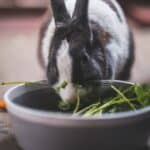
Dogs are optional carnivores who can supplement their diet with vegetables to get the antioxidants and fiber they need.
The debate on whether dogs are carnivorous or omnivorous animals is still open. Depending on the source you consult, opinions can be mixed. This is why it is normal to ask the question: can dogs eat vegetables? Read on to find out if it is recommended that dogs eat vegetables.
Are dogs carnivores or omnivores?
Dogs are mammals belonging to the Canidae family . This includes different types of animals, from the wolf ( Canis lupus), to the golden jackal ( Canis aureus) , to the coyote ( Canis latrans) or to the dingo ( Canis lupus dingo) among others.
All animals belonging to the canine family share a number of characteristics:
- They are digitigrades. They walk on the phalanges.
- They have strong teeth.
- They have neither retractable nor stinging claws. They don’t use them for hunting.
- They have a strong constitution.
- Within the herds they follow a social hierarchy.
Of all of them, the only ones to have undergone a domestication process are dogs. These are domestic mammals that have always been used for hunting, grazing or guarding activities. There are currently more than 500 different dog breeds.
Although the dog was originally a carnivore, today some consider it omnivorous. In any case, it is an optional carnivore, that is, with the characteristics of carnivores, but capable of assimilating nutrients such as carbohydrates.
Among all these features, we also find sharp teeth (such as premolars, molars and canines). But also the length of the intestine or the type of intestinal flora, which favors the fermentation of nutrients.
Furthermore, each dog breed has its own peculiarities. Some dogs, in fact, tolerate nutrients better than others due to the different intestinal flora.
Can Dogs Eat Vegetables?
Because they are domesticated animals, we know that dogs are capable of assimilating many plant-based nutrients. For this reason they can eat and digest vegetables.
In their natural habitat, dogs would feed exclusively on meat, guts, muscles or bones. But our domestic dogs can enjoy a wider diet.
Dog food contains a high percentage of low-cost carbohydrates , which allows more and more people to vary their dog’s diet.
However, the nutritional quality of this type of food is not very high, which is why new alternative diets for dogs are proposed such as the BARF diet.
The BARF diet suggests feeding dogs and other pets completely raw foods. In this way, depending on the animal, products will be included that give it the most appropriate nutrients for its development.
In the case of the dog, it will be aimed at protein and fat products, and to a lesser extent those that contain fatty acids, minerals and vitamins.
Dogs can therefore eat fruit and vegetables, although it is not known for certain whether they are capable of fully assimilating them. Furthermore, there are no studies demonstrating the complete assimilation of nutrients.
It is believed that in the past, dogs acquired fruit and vegetable supplies through the stomach contents of their prey. These were already partially digested, so they were able to assimilate the nutrients.
Benefits of vegetables for dogs
Vegetables are good for health as they provide antioxidants that eliminate free radicals. If cellular oxidation causes premature aging in humans, in animals it causes the weakening of the immune system , favoring the occurrence of diseases.
In addition, vegetables provide fiber, essential for digestive health in both humans and animals, fighting constipation. But we must not exceed either: the recommended percentages are 3.5% of fiber in the diet.
By doing this, the dog’s diet can be varied by avoiding using only the feed, but by including fruit and vegetables to give it all the nutrients it needs.
What vegetables can dogs eat?
While you can give your furry friends various fruits and vegetables, there are some that they can’t eat for various reasons.
Although vegetables bring numerous benefits to dogs, care should be taken about those that can harm their body.
It is necessary to know which vegetables dogs can and cannot eat. They can feed on many foods that are suitable for people, although the most logical thing is for them to eat the food made especially for them.
Despite this, we can occasionally give our pets some ingredients of our recipes. But which vegetables are suitable and unsuitable for them?
Of all the existing vegetables, dogs can only eat a few. Here they are.
Lettuce and spinach
Lettuce is a food rich in iron and antioxidants, and provides vitamins A, C, E, B and E. For their part, spinach contains a lot of vitamins A, C, E, and K. Both must be washed well and cut. into small pieces to avoid suffocation.
Celery, among the vegetables that dogs can eat
This vegetable is recommended for dogs with arthritis due to its anti-inflammatory properties and as it promotes digestion. Eating celery can help your dog reduce pain from the disease .
Pumpkin
Pumkin is ideal against constipation and its sweet taste will please the dog very much. It is an excellent source of fiber that will improve your furry friend’s intestinal system.
Dogs are pets that have adapted their diet throughout history. Today it is recommended to include around 15% vegetables in their diet, provided their feed does not already contain the appropriate quantities.
Green beans. They have a high content of fiber and magnesium, as well as vitamin K. They are an essential element in your dog’s diet, especially if he tends to be overweight.
Sweet potato. The sweet potato is a tuber that, in addition to delighting your furry friend, will bring him vitamin B6, C and beta-carotene, an antioxidant pigment that will favor his body and extend his life.
Carrot. It provides vitamin C, melanin and many other benefits for your dog’s body. Thanks to its sweet taste, it is an ideal snack.
Cucumber. Many dogs like it, especially in summer, for its high water content. Mix it with some lactose-free or sugar-free yogurt and you will see your pet licking his whiskers.
Peas. They will bring vegetable proteins, magnesium, fiber and vitamin B2.
Spinach . Although spinach has been shown to damage dogs’ kidneys, it does happen if they ingest it in large quantities. That is, if you give it to him once a month, not only will it not hurt him, but it will provide him with fiber, vitamins and antioxidants.
Vegetables that dogs cannot eat
- Onion and the like. Onions, spring onions, leeks, etc., are dangerous for dogs because they contain thiosulfate, which destroys red and white blood cells and causes anemia, which can be fatal depending on the severity.
- Garlic. This, too, contains thiosulfate and can cause rapid heartbeat, sleepiness, hyperventilation, and other ailments.
- Mushrooms. Many types of mushrooms suitable for people are harmful to the organism of dogs.
- Tomato. Tomatoes are not digested by dogs and can cause acute stomach pain .






